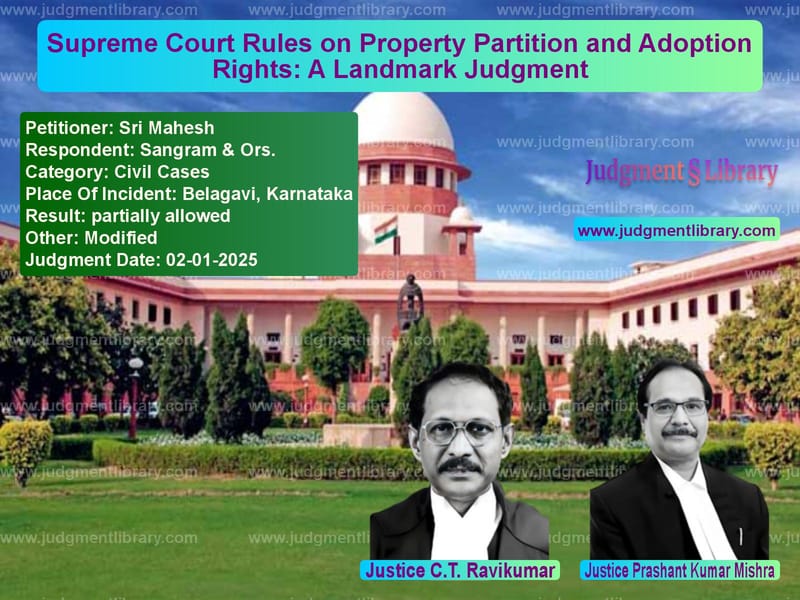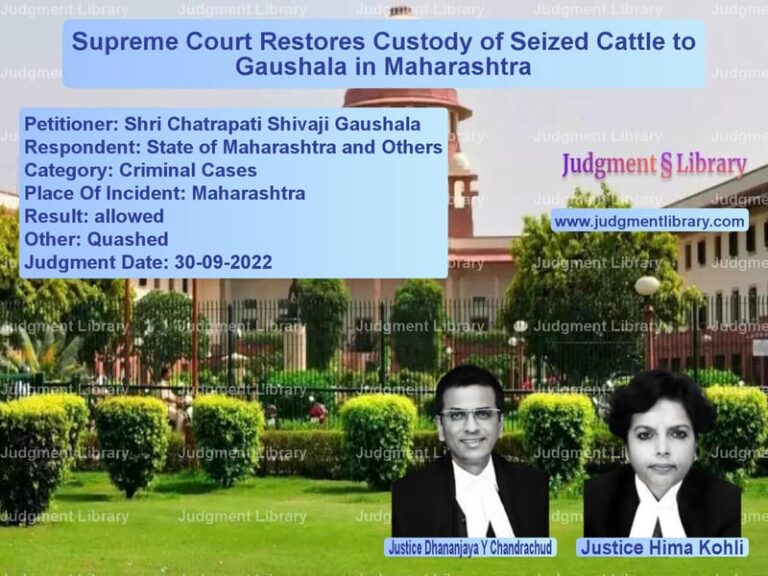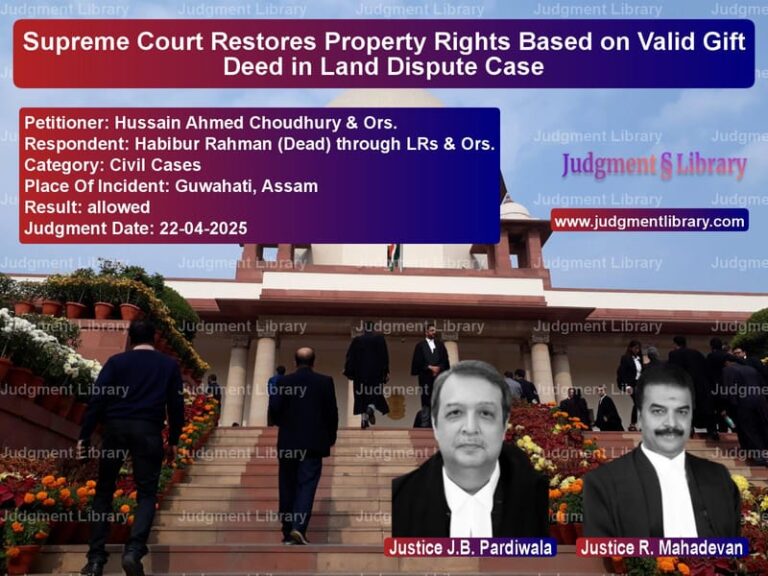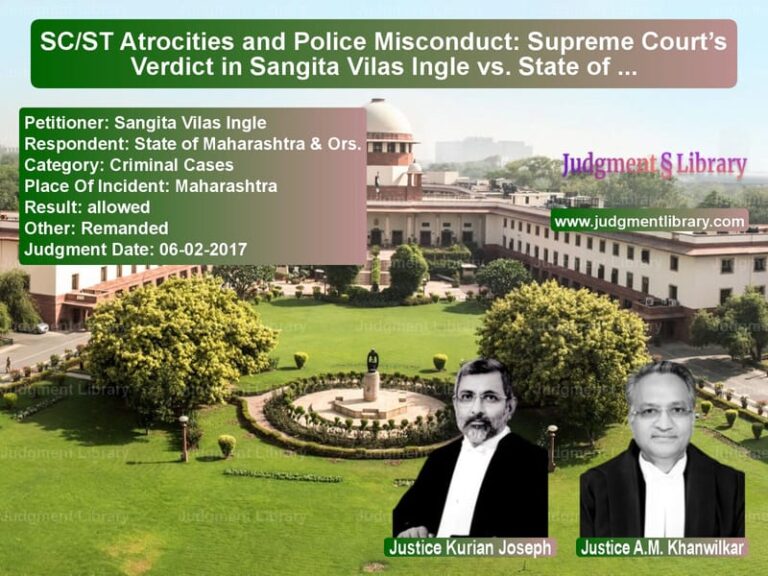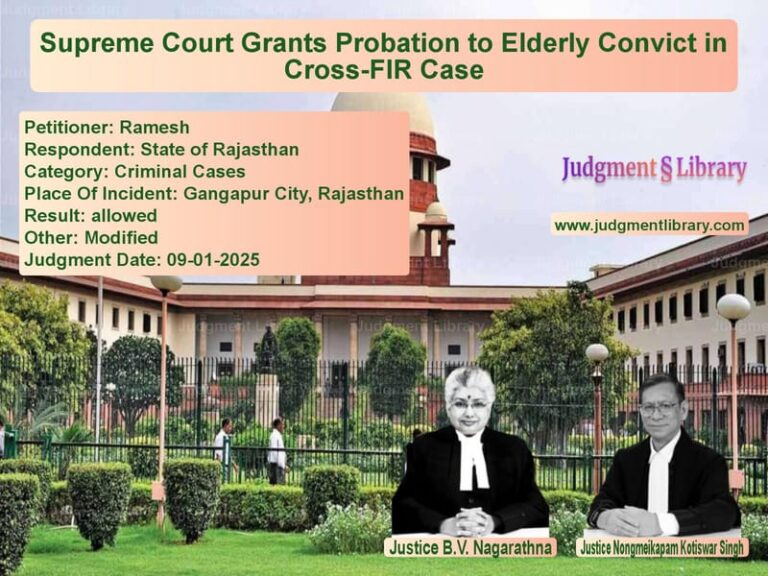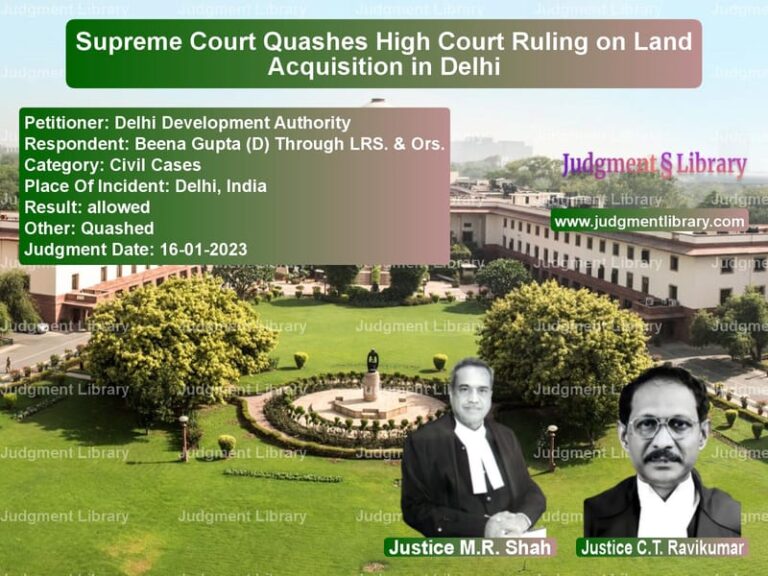Supreme Court Rules on Property Partition and Adoption Rights: A Landmark Judgment
The case of Sri Mahesh vs. Sangram & Ors. involves a long-standing property dispute arising from a family partition and an adopted son’s claim over ancestral properties. The legal questions before the Supreme Court primarily revolved around the validity of adoption, the interpretation of inheritance laws under the Hindu Succession Act, and whether a gift deed executed in favor of other family members could be legally challenged by an adopted heir.
This judgment is significant as it clarifies the rights of an adopted child in the context of property inheritance, the ‘Doctrine of Relation Back’ in adoption cases, and the legal implications of sale and gift deeds executed by a widow.
Background of the Case
The dispute centered around properties originally owned by Bhavakanna Shahapurkar. He had two wives: Parvatibai (legally wedded wife and Defendant No.1) and Laxmibai (second wife without legal dissolution of the first marriage). Through Laxmibai, Bhavakanna had two children, Parashuram and Renuka. Following Bhavakanna’s death on March 4, 1982, Defendant No.1, Parvatibai, filed a partition suit against Laxmibai and her children.
A compromise decree was reached in OS No.266/1982, granting Defendant No.1 a 9/32 share in certain properties. Subsequently, on July 16, 1994, Parvatibai adopted the appellant, Sri Mahesh, through a registered adoption deed.
Key Developments in the Dispute
- Parvatibai executed a sale deed on December 13, 2007, in favor of Defendants No.2 and 3 (Respondents No.1 and 2), selling a portion of the disputed property.
- She also executed a gift deed on August 27, 2008, in favor of Defendants No.4 and 5 (Respondents No.3 and 4).
- The appellant filed OS No.122/2009 seeking partition of the property and challenging both the sale and gift deeds as null and void.
Petitioner’s Arguments
The appellant, Sri Mahesh, argued that:
- Upon his adoption in 1994, he became the legal heir of Bhavakanna and was entitled to half of the suit properties.
- Parvatibai had no absolute right to sell or gift the properties without his consent.
- The sale deed (2007) and gift deed (2008) were executed fraudulently and should be declared void.
Respondent’s Arguments
The respondents (Defendants No.2–5) countered:
- Parvatibai became the absolute owner of the property under the Hindu Succession Act following the 1982 compromise decree.
- The appellant’s adoption did not divest her of ownership under Section 12(c) of the Hindu Adoptions and Maintenance Act, 1956.
- The sale and gift deeds were executed legally and could not be challenged.
Legal Issues Before the Supreme Court
The Supreme Court had to determine:
- Whether the appellant’s adoption entitled him to a share in the property.
- Whether the sale deed executed in 2007 was valid.
- Whether the 2008 gift deed should be upheld.
Supreme Court’s Analysis
Adoption and the Doctrine of Relation Back
The Supreme Court applied the ‘Doctrine of Relation Back’, which states that an adoption relates back to the date of the adoptive father’s death. However, the Court clarified:
“An adopted child shall not divest any person of any estate which vested in him or her before the adoption.”
Thus, since Parvatibai had already acquired absolute ownership before the appellant’s adoption in 1994, his adoption did not grant him rights over the previously owned property.
Validity of the 2007 Sale Deed
The Court upheld the sale deed, stating:
“Since Defendant No.1 was the absolute owner of the property, the sale deed executed in 2007 was legal and binding.”
As a result, the appellant had no right to challenge the sale.
Validity of the 2008 Gift Deed
The Court took a different stance on the gift deed, ruling that:
“A valid gift requires both offer and acceptance. The evidence presented failed to establish that the donees (Defendants No.4 and 5) accepted the gift or took possession of the properties.”
Since possession was never transferred, the Court declared the gift deed null and void, restoring the property to the appellant.
Final Judgment
The Supreme Court ruled:
- The sale deed (2007) was valid and the appellant could not claim a share in that property.
- The gift deed (2008) was invalid due to lack of possession transfer, restoring the gifted properties to the appellant.
- The High Court’s ruling was partially overturned, reinstating the trial court’s decision regarding the gift deed.
Conclusion
This landmark ruling clarifies:
- The rights of an adopted child under Hindu succession laws.
- The significance of absolute ownership in property inheritance.
- The legal prerequisites for a valid gift deed.
By upholding the sale deed while striking down the gift deed, the Supreme Court balanced contractual obligations with legal inheritance rights, ensuring fairness in partition and property disputes.
Petitioner Name: Sri Mahesh.Respondent Name: Sangram & Ors..Judgment By: Justice C.T. Ravikumar, Justice Prashant Kumar Mishra.Place Of Incident: Belagavi, Karnataka.Judgment Date: 02-01-2025.
Don’t miss out on the full details! Download the complete judgment in PDF format below and gain valuable insights instantly!
Download Judgment: sri-mahesh-vs-sangram-&-ors.-supreme-court-of-india-judgment-dated-02-01-2025.pdf
Directly Download Judgment: Directly download this Judgment
See all petitions in Succession and Wills
See all petitions in Property Disputes
See all petitions in Judgment by C.T. Ravikumar
See all petitions in Judgment by Prashant Kumar Mishra
See all petitions in partially allowed
See all petitions in Modified
See all petitions in supreme court of India judgments January 2025
See all petitions in 2025 judgments
See all posts in Civil Cases Category
See all allowed petitions in Civil Cases Category
See all Dismissed petitions in Civil Cases Category
See all partially allowed petitions in Civil Cases Category

